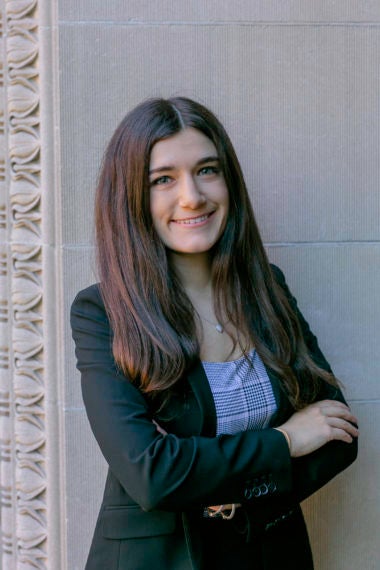By Danielle Mikaelian, J.D. ’25

I joined the Recording Artists Project (RAP) because I was interested in working on projects related to the entertainment industry. I grew up in the Los Angeles area, a main entertainment hub, and loved the idea of representing creators and protecting their rights. However, I never had the chance to do so. As a result, when I was deciding between student practice organizations, I chose to join one that exposed me to an industry that I had no experience in.
Through RAP, I work on a pro bono basis with clients who work in the entertainment industry. Clients of mine can be artists, producers, managers, and so on. Many of them are starting out in their careers and do not have the resources to employ attorneys.
I specifically am part of a team of three first year law students at Harvard. We meet with our clients via Zoom and have our work supervised by an entertainment lawyer. Through this SPO, I’ve primarily gained experience related to writing contracts. This past semester, I worked with a client who conducts business both in the US and internationally. This presented a unique challenge in regard to subject matter jurisdiction and determining what country or state’s laws this client should be considering in their business operations. Our team conducted extensive research on options related to what state or country’s laws our client should be mindful of that may or may not apply to them. As Student Attorneys working on a pro bono project, we were careful not to advise on other state or nation’s laws that we were not familiar with and encouraged our client, who might be subject to unfamiliar laws, to seek more specialized counsel if needed.
Then, we began drafting a contract. The process involved many hours of revising and team meetings. It was important to continue communicating with the client throughout the drafting process in order to make sure that their needs were being met through our proposed contract and its provisions. For instance, a client might want an automatic renewal provision in the contract that guarantees a relationship will continue, versus engaging in one-time deals. Certain clients want to receive a percentage of every deal they participate in, while others want to receive flat-fee payments. We maintain consistent contact with our clients to ensure that the final product adequately will protect them in future transactions.
When I first joined the Recording Artists Project, I was surprised by the level of responsibility that I was given. As a first-year student who hadn’t even completed one Harvard Law School class, I was working with real clients who needed their rights protected via legal mechanisms. Being a part of RAP provided me with the invaluable opportunity to apply the skills I’m learning inside of my classes to real world projects. The Recording Artists Project also provides us with free tickets to concerts in the Harvard area, which has been a fun bonus! Outside of the Recording Artists Project, I’ve further explored my interest in the entertainment industry through my role as a 1L Representative for Harvard’s Committee on Sports and Entertainment Law. I’m looking forward to continuing to explore more areas of law through HLS student practice organizations and clinics during the rest of my time here.
Filed in: Clinical Student Voices
Contact Office of Clinical and Pro Bono Programs
Website:
hls.harvard.edu/clinics
Email:
clinical@law.harvard.edu